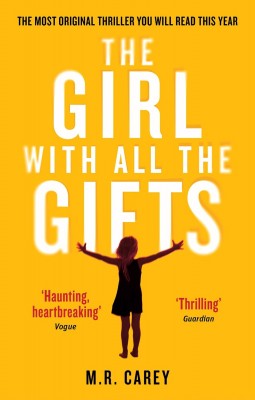
On an Army base codenamed Hotel Echo, in what used to be England, a class full of children is strapped into wheelchairs so tightly that only their eyes can move. They’re young, around ten, but the lessons they learn include Greek myths, calculus, and European history. Melanie, our heroine, is top of the class and has no trouble remembering her lessons. But, she asks her teacher, does the stated population of 1,036,900 include Birmingham’s suburbs, or just the central metropolitan area? “Who cares?” he replies. “It’s irrelevant. The population of Birmingham is zero.”
If you like zombie apocalypse narratives, this one’s a corker. For a start, most of the main characters are female – two women and a young girl – and the male characters are there for muscle, not brains. It passes the Bechdel-Woolf test with flying colours; in fact, I can only think of one or two scenes that pass the reverse test. It might not be exactly original in this genre to ask questions like, “Who are the real monsters, anyway?” But Mike Carey does it well enough, and in an interesting enough way, that my usual inclination towards sarcasm is pretty well torpedoed. All of the characters, whatever we might ultimately think of them, have good reasons for everything they do. They’re complex people, full of ambiguities and sometimes contradictions, and are the key to lifting the novel beyond the mundane (insofar as the prospect of being eaten alive by the undead could be considered mundane).
It did seem, early on, that this novel might fall into what I think of as the midichlorians trap, ie trying too hard to reduce supernatural elements to an explainable pseduoscientific basis. There’s no question about it: there’s an abundance of explanation here. But given the ending, it does, ultimately, prove to be necessary, and I think it’s handled in a way that contributes to the horror rather than detracting from it. And given that one of the main characters is a pathologist studying the zombie disease (which is, for the first time I can remember, neither a virus nor a bacterium but a fungus), the exposition can be inserted more or less organically into the dialogue.
The ending will not be for everyone. It sneaked up on me, though the seeds were there if I’d been looking for them instead just enjoying myself reading. Those whose education featured more of the classics than mine did might be taken less by surprise, since the character Melanie most closely identifies herself with is Pandora, the girl with all the gifts.
From the foregoing, it should be clear that this is a pretty dark novel, and one which, if I had known more about it before reading, I might have chosen to avoid. I’m glad I didn’t.
Note: some casting has been announced for a film version of this book. I’m fine with Glenn Close and Paddy Considine. However: Gemma Arterton as Helen Justineau? There aren’t nearly enough roles for actresses of colour as it is. Is it really excusable to rewrite this character as white? (No offence to Ms Arterton. But really.)